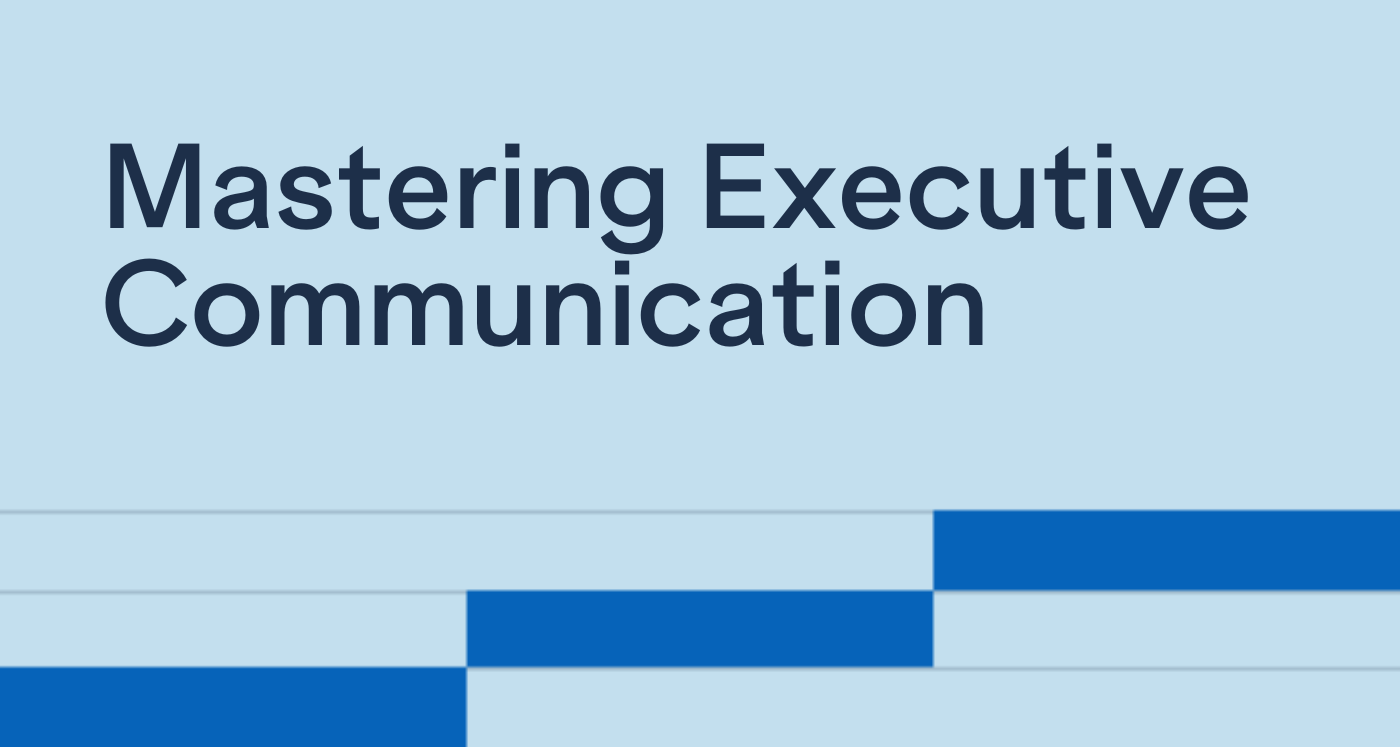
Mastering Executive Communication: Insights from David Calusdian on Effective Investor Relations
Effective investor relations extends far beyond crafting compelling messages. Learn how the experts deliver their story strategically.

The investor relations field offers unique opportunities for finance professionals seeking dynamic, multidisciplinary careers. Patricia Cruz, Senior Manager of Investor Relations at Etsy, Inc. and Board member of the National Investor Relations Institute, shares her perspective on building a successful IR career and navigating an evolving field.
With over eight years of experience in consulting and in-house roles in multiple markets, Patricia’s journey from risk analyst to senior IR manager offers a roadmap for those considering a transition into investor relations.
When you enter the investor relations field, you’ll likely choose between two paths: consulting or in-house. Each comes with distinct advantages and challenges that shape your growth.
Patricia recommends starting your IR career at an advisory firm, describing it as "a great school to learn about IR." Consulting roles provide exposure to various industries, geographies, market capitalizations, and team structures.
“You get to learn about everything holistically. Each day, it's a new adventure because you have access to all sorts of IR challenges and crises, and oftentimes, because budget is less of a restriction, you have better access to research and other tools.”
In an advisory firm, you work as an extension of client IR teams, helping design effective investor relations programs based on company goals, needs, and budgets. Common services include market intelligence, strategy and communications advisory, investor engagement, and special situations support for mergers, acquisitions, and corporate crises.
However, consulting work comes with limitations. Despite efforts to integrate with client operations, advisory teams remain dependent on clients for information access. Your effectiveness relies heavily on how well clients facilitate communication between the agency and various operational departments.
Meet Irwin’s trusted advisors →
In-house investor relations teams operate within public companies, typically as small, specialized units of one or more persons. These roles offer greater access to executive leadership and operations, positioning you as part of the team actually running the business rather than just discussing it. You have the ability to influence strategic decisions because your input represents investor perspectives and community insights.
Working in-house allows you to specialize deeply in one industry and collaborate more effectively with internal teams, ensuring consistent communication strategies across all channels. The downside involves limited growth opportunities due to small team sizes, though Patricia notes that the business expertise you develop makes you valuable for horizontal moves throughout the organization.
“Working in-house, you become an expert on your own company. And so you become super valuable. If you don't want to stay in IR, then you can do something else within the company.”
Patricia's transition to Etsy followed five years of agency experience. She emphasizes the importance of timing, ensuring you have sufficient experience and knowledge to provide value to an in-house team. Many companies cannot afford agencies on retainer, making them heavily reliant on team members to deliver strategic advice and value.
The transition process involves careful consideration of industry preferences, team dynamics, and cultural fit. Patricia recommends evaluating whether you prefer larger teams with more defined roles or smaller teams requiring multiple responsibilities. She prioritized finding a team that felt right culturally, viewing the move as a long-term commitment rather than a temporary change.
The IR community's collaborative nature creates excellent networking opportunities for newcomers. Patricia particularly recommends the National Investor Relations Institute (NIRI) as a starting point for IR professionals in the United States. Many of NIRI’s regional chapters run a NextGen program addressing the needs of younger professionals who previously felt out of place at senior-focused networking events.
NextGen offers courses, events, and mentorship programs that connect emerging professionals with experienced practitioners. The IR community demonstrates remarkable openness to sharing expertise and guidance, with professionals regularly connecting with newcomers seeking career advice.
Beyond NIRI, she mentions the Investor Relations Charter (IRC) as a valuable credential for those with foundational knowledge, even if only textbook-based. Various universities now offer IR programs, though networking remains the most effective path into the field.
For international professionals, similar organizations exist globally, including the Investor Relations Society in the UK, the Middle East Investor Relations Association, and the Canadian Investor Relations Institute, providing networking opportunities wherever public companies concentrate.
Additionally, Patricia encourages direct outreach to IR teams, noting that company websites provide easy access to contact information. The community's willingness to share experiences and insights creates valuable learning opportunities for those entering the field.
Investor Relations demands multidisciplinary expertise across three primary knowledge areas: finance, accounting, and capital markets; communications and marketing skills (both oral and written); and legal knowledge, including securities regulation and corporate governance.
Equally important are soft skills, including problem-solving abilities, attention to detail, interpersonal skills, collaboration capabilities, and most critically, listening skills. Patricia emphasizes that many IR professionals struggle with active listening, yet it remains essential for understanding investor questions and executive needs.
“You're working with high level executives, you're working with your C suite, you're working with a board. So you want to be able to know exactly what is it that they need from you and be able to deliver. You want to be able to be a person that they want to consider including when big decisions are being made. But that will only happen if you learn how to listen. It sounds super simple, but I've seen people struggle with it.”
The ability to listen carefully helps you avoid miscommunication with investors while ensuring you understand exactly what C-suite executives and board members need from you. Developing strong listening skills positions you as someone executives want at the table when making significant decisions.
Patricia wishes she had better understood the gender dynamics within the field before starting her career. Despite the significant presence of women in IR roles, compensation and treatment gaps persist between men and women. While this reality didn't change her career choice, she notes she could have been less passive in meetings and more proactive about requesting seats at important tables.
This insight leads to broader advice about advocating for yourself in the IR field. The industry attracts people with strong opinions, making it essential to ask for what you want directly. Patricia emphasizes that no one will offer opportunities unprompted—you must advocate for yourself, with the worst possible outcome being a simple "no."
“To people starting in IR, women or not, it's a world where people have strong opinions. So don't be afraid to ask what you want. Nobody's going to come and ask you what you want or need. No one will. So don't be afraid to just ask for things. The worst thing they can say is no, that's it.”
Patricia's primary recommendation for success in IR involves learning to influence people effectively. Your role depends entirely on collaboration with various company teams, from product to marketing and beyond. You cannot accomplish your objectives without their assistance, making it crucial to maintain positive working relationships while still getting work completed.
“Learn how to influence people. People skills are important, not only because you are working with investors, but because you rely on other teams. You can't do your job without their help.”
The ability to influence extends to interactions with board members and executive teams, particularly when investor perspectives differ from management thinking. Some executives resist transparency, despite transparency being fundamental to effective investor relations. Your success depends on navigating these dynamics skillfully.
The investor relations field offers rewarding opportunities for finance professionals seeking interesting and challenging careers. Success requires multidisciplinary expertise, strong interpersonal skills, and the ability to bridge communication gaps between companies and their investor communities.
Whether you choose consulting or in-house paths, focus on developing comprehensive skill sets that span finance, communications, and legal knowledge. Leverage networking opportunities through professional organizations, and don't hesitate to reach out directly to experienced practitioners for guidance.
Most importantly, remember that IR success depends heavily on your ability to collaborate, influence, and communicate effectively across various stakeholder groups. By developing these capabilities alongside technical expertise, you position yourself for long-term success in this dynamic and evolving field.
The investor relations community's collaborative spirit creates an environment where newcomers can learn from experienced professionals while building the skills necessary for career advancement. With proper preparation and strategic networking, you can build a successful career helping companies effectively communicate with their investor communities.
Gwt 10 Seasoned IR Experts’ Top Tips for Career Growth in Investor Relations

Effective investor relations extends far beyond crafting compelling messages. Learn how the experts deliver their story strategically.

Across geographies and market caps, one theme is consistent: IR is entering a period of recalibration. Learn what's changing in 2026.

Learn how seasoned IR veterans are executing targeting strategies for small-mid-cap companies.